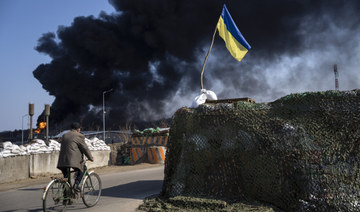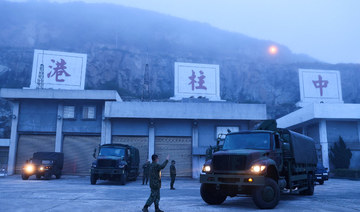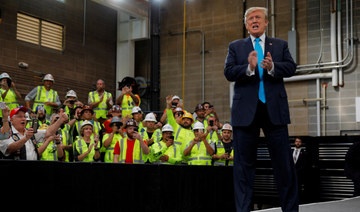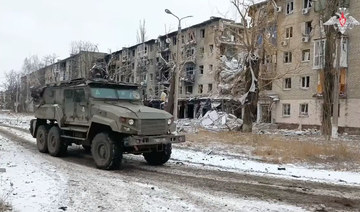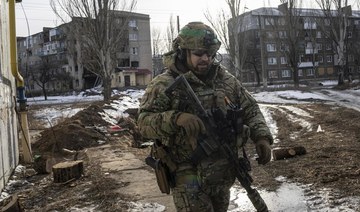LVIV, Ukraine: Each day searing stories pour out of Ukraine: A maternity hospital bombed in Mariupol. A mother and her children killed as they fled Irpin in a humanitarian corridor. Burning apartment blocks. Mass graves. A child dead of dehydration in a city under siege, denied humanitarian aid.
Such images have contributed to a growing global consensus that Russia should be held accountable for war crimes in Ukraine.
“The world’s strongmen are watching like crocodiles … We have to show tyrants around the world that rule of law is stronger than rule of gun,” said David Crane, a veteran of numerous international war crime investigations.
Even as the conflict rages, a vast apparatus is being built to gather and preserve evidence of potential violations of international laws of war that were written after World War II. Less than a month after Vladimir Putin’s order to drop the first bombs on his neighbor, the United States declared that Russian forces were committing war crimes in Ukraine. But it remains far from clear who will be held accountable and how.
Here’s a look at what war crimes are and what options exist for bringing those responsible to justice.
WHAT ARE WAR CRIMES?
A war crime is a violation of the laws of war. While the architecture of international criminal law has been built over decades, the concept is straightforward.
“If there’s no military necessary reason to target something, it’s a war crime. If you’re just shooting like `Mad Max Thunderdome’ then it’s a war crime,” said Crane.
The core principles of international humanitarian law are enshrined in the Geneva Conventions, the bulk of which came into force after World War II, and the Rome Statute, which established the International Criminal Court in 1998.
They provide protections for civilians in times of war, as well as for prisoners of war and the wounded. Possible war crimes that have been reported in Ukraine: widespread destruction of people’s homes, firing on civilians as they evacuate through safe corridors, targeting hospitals, using indiscriminate weapons like cluster bombs in civilian areas, attacks on nuclear power plants, intentionally blocking access to humanitarian aid or basic needs like food and water.
But intention matters. Destroying a hospital alone is not evidence of a war crime. Prosecutors would have to show that the attack was intentional or at least reckless.
Crimes against humanity, which have been codified in the statutes of a number of international criminal tribunals, occur when a state launches a widespread or systematic attack against civilians involving murder, deportation, torture, disappearances or other inhumane acts.
The mass mobilization of Ukrainian citizens to fight off Russian invaders may complicate the case against Putin. Russia could try to use the blurred distinction between civilian and combatant as a justification for attacks on civilian areas.
Some examples of recent convictions:
— In 2012, the International Criminal Court convicted warlord Thomas Lubanga Dyilo of drafting and enlisting children under 15 years old to fight in an ethnic conflict in the Democratic Republic of Congo. He is serving a 14-year sentence.
— Radovan Karadžić, president of the Republika Srpska, a self-proclaimed Serb republic within Bosnia, was convicted of crimes against humanity, war crimes and genocide — most notoriously, the murders of more than 7,000 people in Srebrenica in 1995. He is serving a life sentence imposed by the International Criminal Tribunal for the Former Yugoslavia.
— Jean-Paul Akayesu, a mayor convicted of genocide, crimes against humanity — including rape — and incitement to commit genocide in the 1994 Rwandan ethnic bloodbath. The International Criminal Tribunal for Rwanda sentenced him to life in prison.
WHAT IS THE INTERNATIONAL CRIMINAL COURT?
The International Criminal Court, located in the Hague, can prosecute individuals for war crimes, crimes against humanity, genocide and the crime of aggression.
The court holds sway over its 123 member countries. Ukraine is not among them but has granted the ICC jurisdiction. On Feb. 28, the ICC’s chief prosecutor, Karim Khan, announced that he would investigate suspected atrocities in Ukraine after an unprecedented 39 member states asked him to do so. Since then, more states have signed on to that request.
“There is a reasonable basis to believe that both alleged war crimes and crimes against humanity have been committed in Ukraine,” Khan said at the time.
There are important limitations to what the ICC can do. It doesn’t have the power to investigate Russia for what judges at the Nuremberg tribunal after World War II called the “supreme international crime,” the crime of aggression — that is, the decision to wage a ruthless, unprovoked war against another country, which international lawyers say would be the easiest way to hold Putin accountable.
That’s because Russia, like the United States, isn’t a party to the ICC.
When the ICC statute was amended to include the crime of aggression, the United States, Russia and China pushed for – and got — a carveout to protect citizens of countries that have not signed on to the court from being prosecuted on that charge. The UN Security Council can override that by voting to refer a matter to the ICC, but Russia has a seat on the Security Council and could easily torpedo any such initiative.
Another limitation of the ICC is that the court cannot try people in absentia.
“There would be no trial at the ICC of Putin until he is physically present in the courtroom,” said David Scheffer, who was the first ever US Ambassador at Large for War Crimes Issues and led the US delegation at talks establishing the International Criminal Court.
But the ICC could indict Putin even if he stays put in Moscow and issue an international warrant for his arrest, Scheffer said. That would seriously curtail Putin’s overseas travel and damage his standing both at home and abroad.
HAVE ANY COURTS ALREADY MOVED AGAINST RUSSIA FOR ITS ACTIONS IN UKRAINE?
Yes. On March 1, the European Court of Human Rights, in Strasbourg, told Russia to stop attacking civilians and bombing people’s homes, hospitals and schools and start ensuring civilians safe evacuation routes and access to humanitarian aid. Then, on Mar. 16, the UN’s highest court, the International Court of Justice, ordered Russia to suspend military operations in Ukraine. Both courts consider violations by states, rather than individuals.
Russia simply ignored them.
“There is no international police or international military force that can support any international court judgment,” said Ivan Lishchyna, an adviser to Ukraine’s Ministry of Justice who helped Ukraine make its case at the European Court of Human Rights. “It’s not like you receive a judgment and everything gets peaceful and quiet and everyone is punished for violating international law. It’s much more complicated.”
Many Ukrainians, including Lishchyna, would like to see Russia pay for its transgressions and cover the massive cost of repairing damage wreaked by its bombs. “If compensation were paid, I would consider that I did something good in my life,” Lishchyna said.
The ECHR could order Russia to pay compensation. But the only leverage the ECHR would have if Russia didn’t pay up would be to exclude it from the Council of Europe – which already happened on March 16. The ICJ could also order Russia to pay reparations, but the UN Security Council – where Russia holds a permanent seat and veto power – would have to enforce the judgment.
Scholars, prosecutors and politicians have started discussing whether Russian assets frozen under global sanctions could be used in the future to pay reparations to Ukraine.
CAN OTHER COUNTRIES PROSECUTE RUSSIAN OFFICIALS FOR WAR CRIMES, EVEN IF THEY’RE NOT DIRECTLY IMPACTED?
Yes. Poland, Germany, Lithuania, Latvia, Estonia, France, Slovakia, Sweden, Norway and Switzerland all opened independent investigations into Russia’s activity in Ukraine within the first month of the conflict. They can do so under the legal concept of “universal jurisdiction,” which allows countries to use domestic courts to prosecute individuals for grave violations of international law, like crimes against humanity, torture and war crimes – even if they are committed abroad by foreign perpetrators against foreign victims.
This approach has produced results in the past. So far, the only convictions of Syrian government officials for atrocities committed during the country’s long-running civil war have been handed down by German courts. Courts in other European countries also have convicted members of armed groups in Syria, including Daesh militants, for crimes committed during the war.
Within the first month of Russia’s war against Ukraine, Polish prosecutors said they had collected some 300 witness testimonies from refugees pouring over the border. In March, Poland, Lithuania and Ukraine agreed to set up a joint international investigative team on Russian war crimes in Ukraine. Efforts have been ongoing to expand the scope of that collaboration.
While the ICC typically only tries a handful of high-profile cases, prosecutions in national courts can cast a wider net and hold more people accountable. But they too have a limitation: Sitting heads of state, like Putin, and senior officials, like Russia’s foreign minister, Sergey Lavrov, generally have immunity from prosecution in other countries, said Ryan Goodman, professor of law at New York University and former special counsel at the Department of Defense.
“This probably knocks out of contention the independent national jurisdictions of Germany, Poland etc. in getting Putin, Lavrov and maybe others,” Goodman said. “But they’d be able to go after a lot of other senior Russian officials.”
IS UKRAINE PROSECUTING RUSSIAN WAR CRIMES CASES?
Yes. Ukraine’s prosecutor general, Iryna Venediktova, said that in the first month of the war, Ukraine launched investigations into more than 2,500 war crimes cases and identified 186 suspects, including Russian government officials, military leaders and propagandists.
But as top government officials, Putin and Lavrov would likely be immune from prosecution in Ukrainian courts.
ARE THERE ANY OTHER OPTIONS?
Yes. The Nuremberg Tribunal, set up after WWII to try Nazi war criminals, looms large as an example of how Putin could be held accountable by a court set up specifically for that purpose. And special tribunals were established to investigate crimes in Yugoslavia and Rwanda, among other places.
In theory, such a court could do what the ICC cannot: Prosecute Putin for the crime of aggression, even if he stays in Russia.
In early March, a campaign to create a special tribunal to investigate the crime of aggression against Ukraine, dubbed Justice for Ukraine, kicked off and quickly gained momentum. More than 140 prominent lawyers, scholars, writers and political figures, including Ukrainian Foreign Minister Dmytro Kuleba, former British Prime Minister Gordon Brown and a former prosecutor for the Nuremberg tribunal, have signed on. A public petition in support of the effort got over 1.3 million signatures within weeks.
Criticisms of this approach include that it could take too long to set up, cost too much money, lack legitimacy and create the appearance of selective justice. Why, some argue, should there be a special tribunal for Russian aggression in Ukraine when there wasn’t one against the US and its allies for invading Iraq?
But others say Putin’s attack on Ukraine has shown just how inadequate existing legal options are and that a new approach is urgently required.
“Since World War II we haven’t had a case of brazen, large-scale aggression by one sovereign European nation against another,” said Mykola Gnatovsky, a prominent Ukrainian lawyer and professor who has been tapped by Ukraine’s foreign ministry to help craft a new Nuremburg-style tribunal for Russian aggression. “Accountability is important because accountability is a way to prevent this in the future.”
How would those accused of Ukraine war crimes be prosecuted?
https://arab.news/nnrg4
How would those accused of Ukraine war crimes be prosecuted?
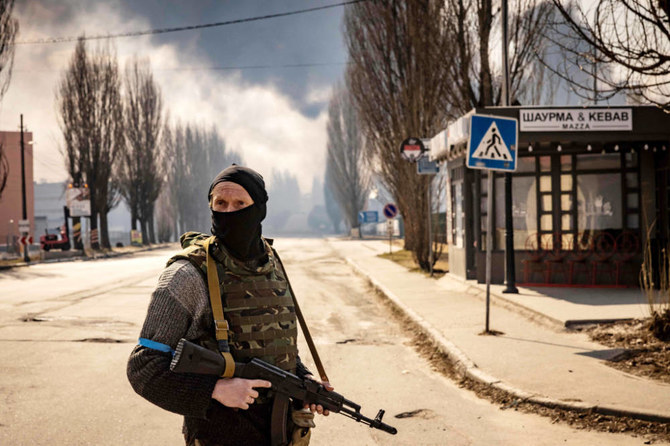
- Less than a month after Vladimir Putin’s order to drop the first bombs on his neighbor, the United States declared that Russian forces were committing war crimes in Ukraine
China could arrange Russia-Ukraine peace conference, Lavrov tells RIA

- Russia has repeatedly called for talks with a precondition that Kyiv and the West recognize its territorial gains in Ukraine
- Lavrov criticized the United States for aiding Ukraine, which Russian invaded in February 2022
China could arrange a peace conference in which Russia and Ukraine would participate, the RIA news agency cited Russian Foreign Minister Sergei Lavrov as saying on Thursday.
Lavrov said such a move would be a continuation of Beijing’s efforts to resolve the Ukrainian crisis.
“We share (China’s) position that the root causes of the conflict need to be addressed in the first place and legal interests of all parties need to be protected, with subsequent agreements based on the principle of equal and indivisible security,” Lavrov said in an interview with the agency.
“Let me underscore again, this entails respecting realities on the ground, which reflect the will of people living there.”
Russia has repeatedly called for talks with a precondition that Kyiv and the West recognize its territorial gains in Ukraine. Kyiv has rejected those proposals.
Lavrov criticized the United States for aiding Ukraine, saying Washington has become “an accomplice in the crimes of the Kyiv regime.” In the Middle East, Lavrov said, the United States was also “fanning the flames of conflict.”
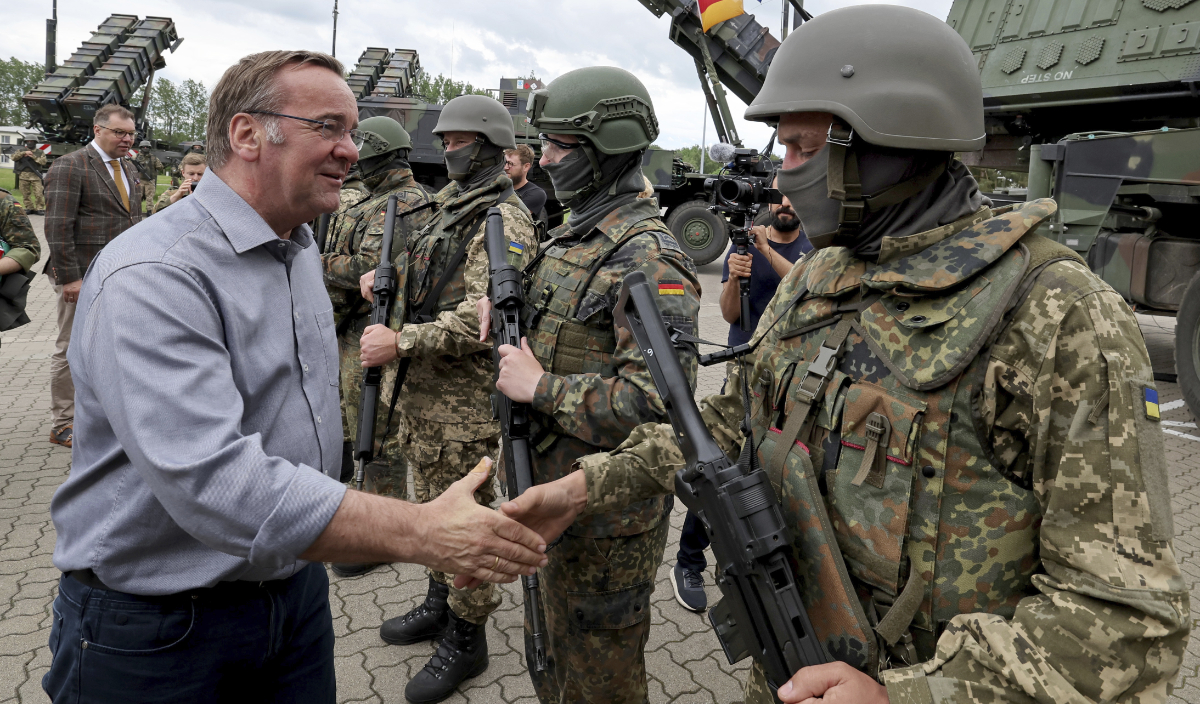
‘Are you with me?’ Biden and Harris launch Black voter outreach and warn of a second Trump term

- Speaking at Girard College, which has a predominantly Black student body, Biden argued that an “unhinged” Trump is peddling misinformation in an effort to win back the White House
PHILADELPHIA: President Joe Biden renewed his election-year pitch to Black voters on Wednesday, lashing out at Donald Trump’s “MAGA lies” and saying the winner of this year’s White House race will make crucial decisions, including on nominees for the Supreme Court, that could affect the country for decades.
Biden and Vice President Kamala Harris, in a joint appearance at a Philadelphia boarding school, thanked Black voters in Pennsylvania and beyond for being the lynchpin to their 2020 victory and they made the case that their agenda has had an enormous impact on improving lives for Black voters.
The Democratic president also argued that an “unhinged” Trump is peddling misinformation in an effort to win back the White House.
“I’ll be damned if I’m going to let Donald Trump turn America into a place of anger, resentment and hate,” Biden said, calling on the crowd to help him and Harris win a second term. “My question is a simple one: Are you with me?”
At Girard College, which has a predominantly Black student body, Biden warned about the threat he said a second Trump presidency would pose and cited some of the racial controversies fanned by the presumptive Republican nominee during his life.
“This is the same guy who wanted to tear gas you as you peacefully protested George Floyd’s murder. The same guy who still calls the Central Park Five guilty, even though they were exonerated,” Biden told the crowd. “He’s that landlord who denies housing applications because of the color of your skin.”
The Philadelphia visit was the start of what the Biden campaign describes as a summerlong effort to engage Black student organizations, community groups and faith centers. It reflects in part how much of their support of him has frayed as Trump aims to make inroads into the longtime Democratic constituency.
The issue of abortion rights and the judiciary also featured in the remarks from Biden and Harris. Biden pledged to codify the protections of Roe vs. Wade, the now-nullified Supreme Court decision that had legalized the right to an abortion, if he and enough Democratic lawmakers are elected, while Harris noted that Trump dramatically shaped the Supreme Court as she invoked the name of Thurgood Marshall, the high court’s first Black justice.
Trump, she said, “handpicked three members of the Supreme Court — the court of Thurgood — with the intention that they would overturn Roe vs. Wade,” the landmark abortion rights ruling. “And as he intended, they did.”
“Who sits in the White House matters,” she said.
Underscoring that point later, Biden said the next president is “going to be able to appoint a couple justices.” With some vacancies on the Supreme Court, Biden said he could “put in really progressive judges, like we’ve always had.”
“Tell me that won’t change your life,” he said.
Among Black adults, Biden’s approval has dropped from 94 percent when he started his term to just 55 percent, according to an Associated Press-NORC Center for Public Affairs Research poll published in March.
The economy has been a particular thorn in Biden’s side since 2022, when inflation hit a 40-year high. But there have also been signs of discontent in the Black community more recently over Biden’s handling of the seven-month Israel-Hamas war.
Turning out Black voters could prove pivotal for Biden’s chances in what’s expected to be among the most closely contested states — Arizona, Georgia, Michigan, Nevada, Pennsylvania and Wisconsin. Biden beat Trump in all six states in 2020, but he could face a more difficult climb this year.
Trump has been offering himself as a better president for Black voters than Biden. At a rally last week in the Bronx, he railed against Biden on immigration and said “the biggest negative impact” of the influx of migrants in New York is “against our Black population and our Hispanic population who are losing their jobs, losing their housing, losing everything they can lose.”
The Republican National Committee zeroed in on gas prices and food costs under Biden’s presidency as it attacked his stop in Pennsylvania.
“No matter how much Biden lies, he cannot gaslight Pennsylvanians into supporting him — his approval ratings are abysmal,” RNC Chair Michael Whatley said. “President Trump continues to lead in polls in Pennsylvania and across the country. Pennsylvanians are ready to Make America Great Again, and they will vote for President Donald J. Trump in November.”
The Biden campaign wants to use the new engagement effort in part to remind Black voters of some of the Democratic administration’s achievements during his term. On Wednesday, Biden repeated the refrain “because you voted” as he rattled off a litany of his accomplishments for Black Americans, including record funding for historically Black colleges and universities, forgiveness of federal student loan debt and pardons for simple possession of marijuana.
“Black voters placed enormous faith in me,” Biden said. “I’ve tried to do my best to honor that trust.”
Biden later visited with Black business owners at SouthSide, an event space, and greeted supporters there while continuing to tout his accomplishments for Black voters and, in particular, the economic gains under his presidency. In the more intimate gathering, jointly hosted by the African-American Chamber of Commerce of Pennsylvania, New Jersey, and Delaware, he also stressed to the crowd that “there’s not a damn thing that a white man can do that a Black man can’t do, or do better.”
The Black unemployment rate sits at 5.6 percent, according to the latest federal government data, compared with an average of about 8 percent from 2016 to 2020 and 11 percent from 2000 to 2015. Black household wealth has surged, and Biden’s effort to cancel billions in student loan debt has disproportionately affected Black borrowers.
Biden also points to his appointment of Ketanji Brown Jackson as the first Black female justice on the US Supreme Court and his pick of Harris as the first Black woman to serve as vice president.
The president’s visit to Philadelphia follows a series of engagements with Black community members in recent weeks, including hosting plaintiffs in the 1954 Supreme Court decision that struck down institutionalized racial segregation in public schools, a commencement address at Morehouse College in Atlanta, and a virtual address to the Rev. Al Sharpton’s racial justice conference.
Russian forces launch missiles on Kharkiv, four injured, Ukrainian officials say

- In the aftermath of the strikes, air raid alerts remained in force throughout the country
Russian forces launched a series of missiles early on Thursday on Kharkiv, Ukraine’s second largest city, injuring at least four people and damaging infrastructure, local officials said.
Mayor Ihor Terekhov, writing on the Telegram messaging app, said four people had been injured, a gas pipeline had been damaged and many windows had been broken.
Regional Governor Oleh Syniehubov said eight missiles had been fired at the city, a frequent Russian target in recent weeks. A community just north of the city had also been hit.
In the aftermath of the strikes, air raid alerts remained in force throughout the country.
China hosts Arab leaders at summit focused on trade and the Israel-Hamas war

- “As war is raging causing tremendous suffering, justice can’t be absent and the two-state solution can’t be shaken,” Xi said in a speech opening the China-Arab States Cooperation Forum
- The summit is attended by heads of state from Egypt, the United Arab Emirates, Bahrain and Tunisia among others
TAIPEI, Taiwan: Chinese President Xi Jinping called for an international peace conference focused on the Israel-Hamas war and promised more humanitarian aid as he opened a summit with leaders of Arab states Thursday in Beijing.
“As war is raging causing tremendous suffering, justice can’t be absent and the two-state solution can’t be shaken,” Xi said in a speech opening the China-Arab States Cooperation Forum.
He called on Arab states to deepen cooperation in areas such as trade, clean energy, space exploration and health care.
The summit attended by heads of state from Egypt, the United Arab Emirates, Bahrain and Tunisia among others was set to focus on China’s expanding trade ties and on security concerns related to the Israel-Hamas war.
Beijing and the Arab states back the Palestinians in the conflict, where Israel is facing growing international condemnation after the strike in the southern Gaza city of Rafah in which at least 45 were killed over the weekend. The overall Palestinian death toll in the war exceeds 36,000, according to the Gaza Health Ministry.
Beijing has long backed the Palestinians and denounced Israel over its settlements in the occupied territories. It has not criticized the initial Hamas attack on Oct. 7 — which killed about 1,200 people — while the United States and others have called it an act of terrorism. However, China does have growing economic ties with Israel.
“China’s priorities in the region are primarily economic,” said Maria Papageorgiou, a lecturer in politics and international relations at University of Exeter. “It wants to continue the momentum established in recent years with Gulf states and expand its investments, particularly in trade, technology (5G networks), and other cyber initiatives.”
Additionally, China wants to present itself as an alternative to the West and a more credible partner to the region, one that doesn’t interfere in the nations’ domestic affairs nor exert pressure, Papageorgiou said.
Present at the forum is Egyptian President Abdel-Fattah El-Sisi, who met Xi on Wednesday. The two leaders signed a series of cooperation agreements in areas such as infrastructure, technology and food imports meant to further their countries’ ties.
China has invested billions of dollars in Egyptian state projects, including a Suez Canal economic zone and a new administrative capital east of Cairo. Investments between Egypt and China amounted to around $14 billion in 2023, compared to $16.6 billion in 2022, according to Egypt’s statistics agency.
Also at the forum are Tunisia’s President Kais Saied, Emirati President Sheikh Mohammed bin Zayed Al Nahyan and Bahrain King Hamad.
The China-Arab States Cooperation Forum was established in 2004 as a formal dialogue mechanism between China and Arab states.
China is Tunisia’s fourth-largest trading partner after Germany, Italy and France. Beijing has financed hospitals and sports complexes in Tunisia, and its companies have been contracted to build strategic infrastructure such as bridges and deep-water Mediterranean ports.
Global team corners Chinese hacker allegedly running ‘likely world’s largest ever’ cybercrime botnet
Global team corners Chinese hacker allegedly running ‘likely world’s largest ever’ cybercrime botnet

- Yunhe Wang was arrested on May 24 in Singapore, and authorities also seized $29 million in cryptocurrency: FBI
- Wang is accused of selling access to the 19 million Windows computers he hijacked to criminals
WASHINGTON: An international law enforcement team has arrested a Chinese national and disrupted a major botnet that officials said he ran for nearly a decade, amassing at least $99 million in profits by reselling access to criminals who used it for identity theft, child exploitation, and financial fraud, including pandemic relief scams.
The US Department of Justice quoted FBI Director Christopher Wray as saying Wednesday that the “911 S5” botnet — a network of malware-infected computers in nearly 200 countries — was likely the world’s largest.
Justice said in a news release that Yunhe Wang, 35, was arrested May 24. Wang was arrested in Singapore, and search warrants were executed there and in Thailand, the FBI’s deputy assistant director for cyber operations, Brett Leatherman, said in a LinkedIn post. Authorities also seized $29 million in cryptocurrency, Leatherman said.
Cybercriminals used Wang’s network of zombie residential computers to steal “billions of dollars from financial institutions, credit card issuers and accountholders, and federal lending programs since 2014,” according to an indictment filed in Texas’ eastern district.
The administrator, Wang, sold access to the 19 million Windows computers he hijacked — more than 613,000 in the United States — to criminals who “used that access to commit a staggering array of crimes that victimized children, threatened people’s safety and defrauded financial institutions and federal lending programs,” US Attorney General Merrick Garland said in announcing the takedown.
He said criminals who purchased access to the zombie network from Wang were responsible for more than $5.9 billion in estimated losses due to fraud against relief programs. Officials estimated 560,000 fraudulent unemployment insurance claims originated from compromised IP addresses.
Wang allegedly managed the botnet through 150 dedicated servers, half of them leased from US-based online service providers.
The indictment says Wang used his illicit gains to purchase 21 properties in the United States, China, Singapore, Thailand, the United Arab Emirates and St. Kitts and Nevis, where it said he obtained citizenship through investment.
In its news release, the Justice Department thanked police and other authorities in Singapore and Thailand for their assistance.



